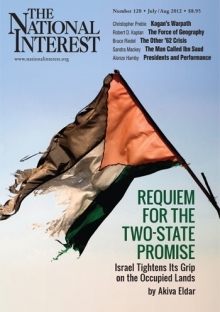|
|||||
|
Please take a moment to visit and log in at the subscriber area, and
submit your city & country location. We will use this information in
future to invite you to any events that we organize in your area.
Will the Middle East Lose Its Importance?
In a provocative and well executed article in
the July/August issue of the National Interest, "The Fading Arab
Oil Empire," Paul
D. Miller, assistant professor of international-security studies at the
National Defense University, argues that
The geostrategic importance of the Middle
East is vastly overblown. The region matters to the United States chiefly
because of its influence in the world oil market, but that influence has been
in terminal decline for a generation, a fact almost wholly unnoticed by
outside observers.
He proceeds to make a sensible argument about
oil becoming less important and the Middle East losing its comparative
advantage at producing oil, concluding from this that
In two decades or so, the global oil market
and the Middle East's geopolitical influence will be dramatically different
from what they are today. … The importance of this development cannot be
overstated. It is a tectonic shift in the geopolitical balance of power, a
strategically pivotal development only slightly less momentous than the fall
of the Soviet Union. It is the slow-motion collapse of the Middle Eastern oil
empire.
This implies for Miller that Washington
can and should begin to adapt its foreign
policy to reflect these realities. It can look with more complacency on the
rise and fall of particular regimes across the Middle East and North Africa.
… The changing realities of the world energy market do not mean the United
States can or should ignore the Middle East. Certainly, Israel's security and
Iran's behavior will keep the region a focus for policy makers' attention.
But, placed in a global perspective, the United States has more or deeper
interests at stake in other regions of the world—especially Europe and
Asia—than in the Middle East.
 This
argument is belied by several facts. First, the very cover of the July/August
issue of the National Interest, with a tattered flag and a lead essay
titled "Requiem for the Two-State Promise: Israel Tightens Its Grip on
the Occupied Lands," negates Miller's point. Passions about the
Arab-Israeli conflict have only remotely to do with oil. The anti-Zionist
forces that rallied in Durban in 2001 and the pro-Israel forces that rally each
spring at the AIPAC policy conference devote roughly zero percent of their
thoughts to oil, gas, or any other hydrocarbons. This
argument is belied by several facts. First, the very cover of the July/August
issue of the National Interest, with a tattered flag and a lead essay
titled "Requiem for the Two-State Promise: Israel Tightens Its Grip on
the Occupied Lands," negates Miller's point. Passions about the
Arab-Israeli conflict have only remotely to do with oil. The anti-Zionist
forces that rallied in Durban in 2001 and the pro-Israel forces that rally each
spring at the AIPAC policy conference devote roughly zero percent of their
thoughts to oil, gas, or any other hydrocarbons.
Second, Islamism, as the only dynamic utopian
and totalitarian ideology extant in the world today, and which largely
originates in the Middle East, presents a civilizational danger only somewhat
connected to oil (the appeal of Islamism will probably decline along with
revenues).
Third, the region, located at the center of
the inhabited world, bristles with dangers, including tyranny, violence, WMD,
and war. These affect everything from sea lane security to refugee immigrants
to domestic security arrangements (take a walk around the White House for a
vivid demonstration of the latter). Only in the Middle East are whole
countries in danger
of extinction. Several countries have descended into anarchy, including
Afghanistan, Iraq, Lebanon, Somalia, and Libya.
For these reasons, I doubt that Miller's advice
that U.S. policymakers "look with more complacency on the rise and fall
of particular regimes across the Middle East and North Africa" will be
listened to anytime soon. (July 1, 2012)
Related
Topics: Middle East
politics, Oil, US policy This
text may be reposted or forwarded so long as it is presented as an integral
whole with complete information provided about its author, date, place of
publication, and original URL.
|
|||||
|
To subscribe to this list, go to http://www.danielpipes.org/list_subscribe.php (Daniel Pipes sends out a mailing of his writings 1-2 times a week.)
Sign up for related (but non-duplicating)
e-mail services:
Middle East Forum (media alerts, event reports, MEQ articles) Campus Watch (research, news items, press releases) at http://www.danielpipes.org/list_subscribe.php |
Monday, July 2, 2012
#1166 Pipes weblog in NRO: "Will the Middle East Lose Its Importance?"
Subscribe to:
Post Comments (Atom)








































No comments:
Post a Comment